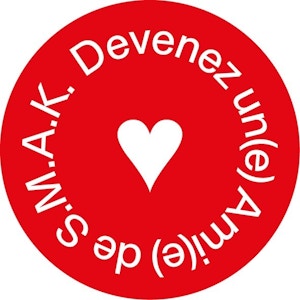Evelin Brosi & Elvis Bonier
forse digitalisering n° 0001 000 0002019
ed. 7/8
Katoen, hardboard, metaal, papier, inkt
31 x 43 cm (kader), 39 x 43 cm (klembord)
Collectie Vrienden van S.M.A.K.
NL - Evelin Brosi en Elvis Bonier zijn twee van de vele alter ego’s van de Belgische kunstenaar, vormgever, auteur en muzikant Boris Van den Eynden (°1984, Schoten). Elk van deze pseudoniemen staat voor een apart talent of vakgebied. Zo is Evelin Brosi de ‘tekstverwerker’ en Elvis Bonier de beeldende - en performancekunstenaar. Veel van het diverse werk van Van den Eynde bevindt zich dan ook op het grensgebied tussen talige en tekstuele communicatie – zowel analoog als digitaal – en het visuele, en kan als een kritische, dwars-humoristische reactie gezien worden op de traditionele kunst- en institutionele kritiek.
Het werkje forse digitalisering 0001 000 000, een editie op tien exemplaren die Van den Eynde uitgaf naar aanleiding van zijn tentoonstelling bij de Vrienden van S.M.A.K. in 2019, is een goed voorbeeld van deze combinatie tussen (digi)talige semiotiek en beeld. In het kader bevinden zich twee handschoenen waarvan één vinger bruin gekleurd is. Op het bijhorende tekstpaneel staat in de volgende droge bewoordingen het werk beschreven: “De kunstenaar draagt witte katoenen handschoenen en voert een rectaal toucher uit, telkens met een andere vinger”.
Met de titel forse digitalisering 0001 000 000 verwijst Van den Eynden natuurlijk op een absurde manier naar de oorsprong van het woord ‘digitaal’ - ‘digit’ - wat zowel ‘cijfer’ als ‘vinger’ betekent. Het klembord met nummering en tekst kan beschouwd worden als een digitale en analoge ‘vertaling’ van de performance, als een soort van alternatief zaallabel dat ons abstract-ludieke ‘informatie’ verschaft over het werk.
FR - Evelin Brosi et Elvis Bonier sont deux des nombreux alter ego de l’artiste, graphiste, auteur et musicien belge Boris Van den Eynden (°1984, Schoten). Chacun de ces pseudonymes représente un talent ou un domaine d’activité distinct. Evelin Brosi est ainsi l’ « éditeur de texte » et Elvis Bonier le plasticien et le performeur. Nombreuses sont donc les œuvres de Van den Eynde qui se situent à la frontière entre communication langagière et textuelle – tant analogique que digitale – et art visuel, et qui peuvent être considérées comme une réaction critique teintée d’humour à la critique artistique et institutionnelle traditionnelle.
La petite œuvre forse digitalisering 0001 000 000, une édition limitée à dix exemplaires que Van den Eynde a sortie à l’occasion de son exposition chez Les Amis du S.M.A.K. en 2019, est un bon exemple de cette combinaison entre sémiotique (digi)langagière et image. Dans le cadre se trouvent deux gants dont un doigt est de couleur brune. Le texte accompagnant l’œuvre explique crûment de quoi il s’agit : « L’artiste porte des gants en coton blanc et effectue un toucher rectal chaque fois avec un autre doigt. »
Par le titre forse digitalisering 0001 000 000, Van den Eynden fait bien sûr allusion de manière absurde à l’origine du mot « digital » - « digit » voulant dire aussi bien « chiffre » que « doigt ». Le presse-papiers avec numérotation et texte peut être considéré comme une « traduction » digitale et analogique de la performance, une sorte de cartel alternatif qui nous fournit des « informations » ludiques abstraites sur l’œuvre.
ENG - Evelin Brosi and Elvis Bonier are just two of Boris Van den Eynden’s many alter egos. Van den Eynden (b. 1984, Schoten) is a Belgian artist, designer, author and musician with a pseudonym for every talent and discipline. Evelin Brosi is the ‘word processor’, for example, while Elvis Bonier is the visual and performance artist. Much of Van den Eynde’s eclectic work sits on the threshold between different means of communication: from linguistic and textual – both analogue and digital – to the visual. It can be read as a critical, contrary-humorous response to traditional art and institutional criticism.
Van den Eynde published forse digitalisering 0001 000 000, a small work in an edition of ten, on the occasion of his Friends of S.M.A.K. exhibition in 2019. It is a typical example of how he combines (digi)linguistic semiotics and images. Inside the frame is a pair of gloves, one finger of which is coloured brown. The accompanying label describes the work in the following dry terms: ‘The artist wears white cotton gloves and performs rectal touching, each time with a different finger’.
Of course, with the title forse digitalisering 0001 000 000, Van den Eynden absurdly refers to the origin of the word ‘digital’ – ‘digit’ – which means both ‘digit’ and ‘finger’. The clipboard with numbers and text can be read as both a digital and analogue ‘translation’ of the performance, a kind of alternative gallery label that imparts abstract-ludic ‘information’ about the work.
















